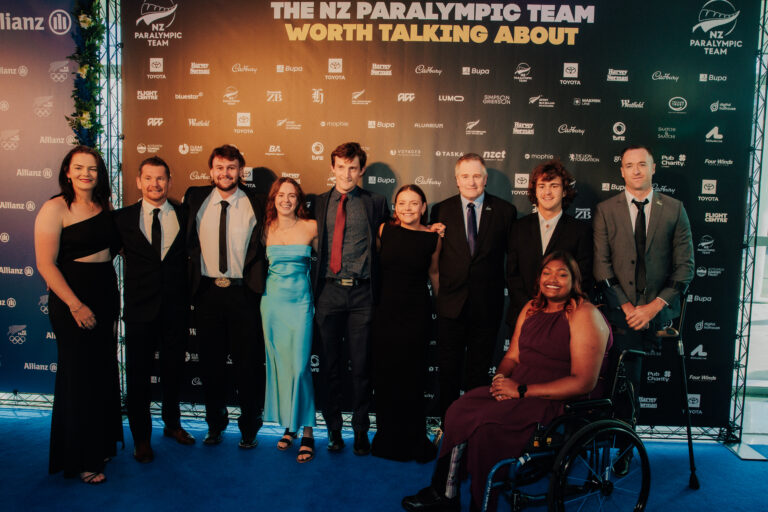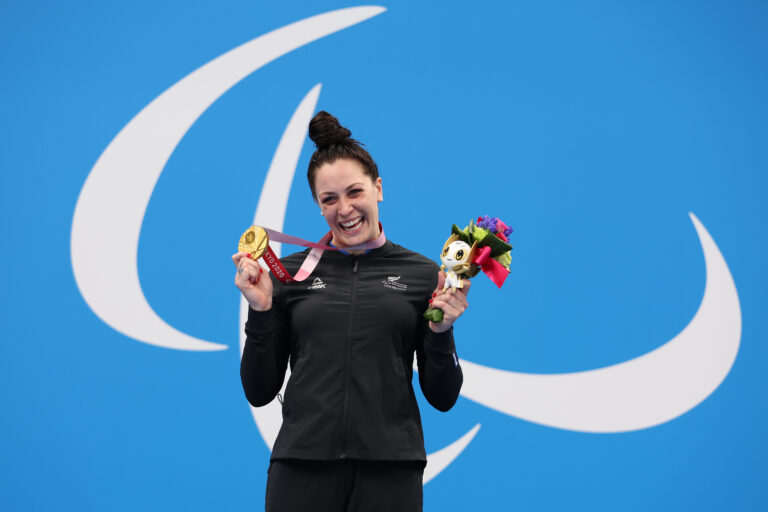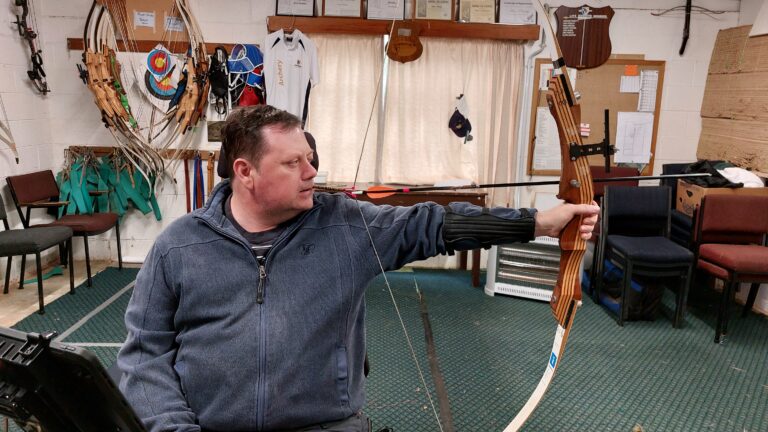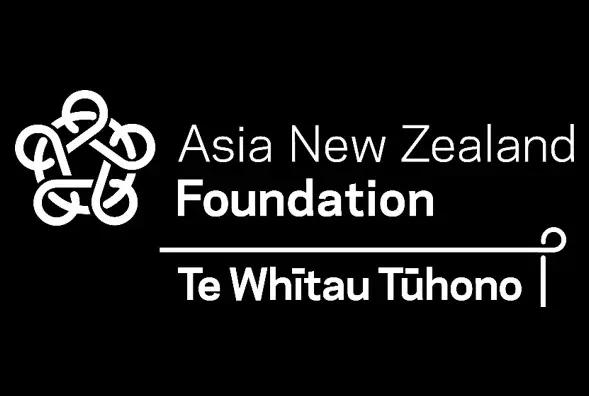When Paralympian #164 Cameron Leslie lines up on the starting blocks at Paris 2024, the three-time Paralympic gold medallist will be all set for his fourth Paralympic Games. We chat to the Para swimming star about his past memories of the Paralympic Games, and his hopes for his latest crack at the big dance, which begin later this month.
From the buzz of Beijing 2008 to the rapture of Rio 2016, Cam Leslie has a raft of unforgettable memories from his three previous Paralympic Games. And he can’t wait to store more rich and vivid memories when he competes across four disciplines at the Paris Le Defense Arena at Paris 2024.
Today aged an elder statesman of the New Zealand Paralympic Team at the age of 34, it is all a far cry from his debut appearance as a teenager at the Beijing 2008 Paralympic Games. A relatively late inclusion to the Team after qualifying via an international meet in England, he recalls the sheer joy of experiencing his first Games.
“Everything was so new and exciting, I just got swept up in it all,” he adds. “I remember life in the Village was heaps of fun. I had only really known the swimmers on the team but suddenly I was thrust into this team of 30 or so which included the New Zealand Wheelchair Rugby team, boccia players and the powerlifter George Taamaru. George was everything Para swimmers were not, and I became fascinated with the guy. He had a big, jovial laugh and I remember he’d eat two whole chickens for lunch. I remember seeing all the fancy equipment and fancy adaptions of the athletes, it was amazing.”
In the pool, Cam also delivered, slashing more than 17 seconds from his pre-Games PB to strike gold in the Men’s 150m Individual Medley SM4 in a blistering world record of 2:33.57.
Not that he initially thought he had grabbed victory.
“In that final 50m I could have sworn I was overtaken,” he recalls. “I was adamant I saw a shadow go past me, and on the footage, you can see me look both ways.”
It was only when confirmation came up on the scoreboard did the Northlander realise the enormity of the achievement.
“I looked up at the clock and saw the world record next to my name,” he recalls. “I had no idea what the world record was, and you can from the footage I was squinting at the leaderboard before the penny dropped that I had won gold in a world record time.”
Part of a young successful New Zealand Para swimming team in Beijing 2008, which also included a teenage Dame Sophie Pascoe who announced her arrival on the international stage with a hat-trick of gold medals, Cam has so many fond memories of his debut Paralympic Games.
“I’d always taken swimming seriously, but winning gold was the moment I took the next step up,” he said. “It was also the first Games where Sophie emerged, which helped inspire the whole team. It was cool to know that not only did I have a big future in the sport but others on the Team did too.”
Four years later the London 2012 Paralympic Games proved a very different experience. Strong favourite to defend his title he delivered in style to defend his Men’s 150m Individual Medley SM4 title in a world record of 2:25.98. However, his emotions were markedly different to Beijing.
“They say your first gold medal is 90 per cent joy and 10 per cent relief and that every medal afterwards is 10 per cent joy and 90 per cent relief and that’s what I felt in London.”
Nonetheless, elated to be supported by a team of eight family and friends in London he was blown away by the general vibe in the British capital.
“I loved it, it was such a cool experience,” he adds. “I felt great sincerity from the supporters and the British public. Those Games really progressed the Paralympic Movement and gave us a great platform to tell our stories.”
At the 2016 Rio Paralympic Games, Cam completed a hat-trick of Men’s 150m Individual Medley SM4 titles in a world record mark of 2:23.12.
Cam recalls striking gold in Rio 2016 gave him an overwhelming feeling of satisfaction and he adds: “I did everything I could that day to be the best athlete I could. I remember touching the wall thinking I could not have given any more.
“The crowd was so loud and I was blessed to swim most of my races alongside the Brazilian Daniel Dias (a 14-time Paralympic champion). I’m not one for wearing headphones to block out the noise, so I wanted to hear the crowd go wild for Daniel. It was also nice for coach, Simon Mayne, to be in the stands in Rio and enjoy the fruits of our work together.”
He also says the gold medal he received at Rio 2016 was his personal favourite.
“The Rio medals had a cavity inside them with ball bearings which made noises depending on the colour of the medal,” he explains. “The gold medal was the loudest and made a sound like a maraca.”
Cam had to make the very tough decision to withdraw from the Tokyo 2020 Games after winning selection not only for the swimming team but also the Wheel Blacks. With his wife scheduled for a caesarean for the birth of their second child just over a week before he was scheduled to leave and with the travel restrictions of Covid at the time, the Kiwi opted to turn down the opportunity to compete for his country.
“It was the hardest decision I’ve ever made in sport,” he said. “While I was present for the birth, I couldn’t afford to get Covid in Tokyo and then risk missing a spot in MIQ and facing the prospect of being stuck overseas for the next three months. With New Zealand qualifying for wheelchair rugby (Cam is also an international wheelchair rugby player) made the decision even harder, but I don’t regret anything.”
Now Cameron makes his long-awaited return to the Paralympic Games following an eight-year gap fuelled by excitement and optimism. Competing in the Men’s 50m Freestyle S4, 100m Freestyle S4, 200m Freestyle S4 and 50m Backstroke S4 events in Paris 2024, Cameron has prepared well from his Whangarei base under the coaching of Tom Onley and approaches his fourth Paralympic Games with a different set of expectations.

“I’m not there to make up the numbers, and I want to hit the podium once again. There is a lot of depth in my events, and they’ll be four or five of us pushing those podium spots. What colour medal? I’m not too bothered, but I’ll be trying my very best.
“But what I most hope to see is the future generations come through and deliver. We saw what happened in Rio 2016 when Nikita Howarth was inspired (she claimed victory in the Women’s 200m Individual Medley SM7) and won gold, I hope to see some of the younger athletes catch the bug and seize their opportunities.”
To find out more Para swimming go here











































